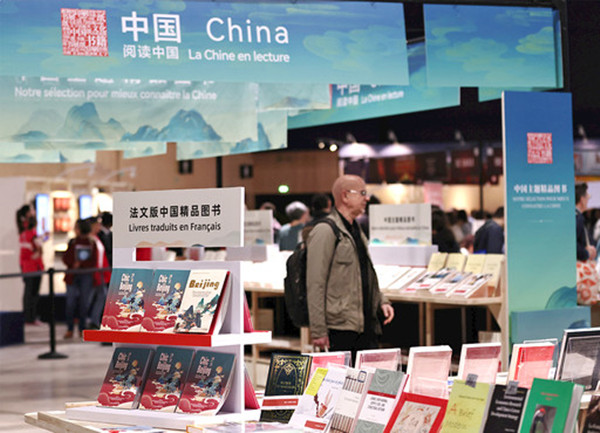


French editions of Chinese books on display at the Salon du Livre Paris 2024 on April 12 Photo: XINHUA
Over a hundred experts and scholars from various think tanks, universities, and research institutes in China and France convened in Paris on May 3 for a seminar titled “Exchanges and Mutual Learning Between Chinese and French Civilizations: Review and Outlook.”
In his speech at the opening ceremony of the seminar, Gao Xiang, president of the Chinese Academy of Social Sciences (CASS), said that strengthening mutual learning and enriching cultural exchanges between China and France, two time-honored civilizations, are the inherent requirements for advancing people-to-people connectivity, consolidating the foundation of mutual trust, and deepening partnership.
Gao cautioned against the resurgence of the “clash of civilizations” theory amidst the current intricate international landscape. He called on the two countries to intensify cultural exchanges and mutual learning to establish a paradigm for harmonious coexistence and win-win cooperation among diverse civilizations.
Also addressing the opening ceremony, Jean-Francois Huchet, president of the Paris-based National Institute for Oriental Languages and Civilizations (Inalco), emphasized that France and China have increased academic exchanges in social sciences since the two countries established diplomatic relations 60 years ago. Their research areas have continuously expanded to cover languages, cultures, sociology, and economics, and bilateral academic cooperation sees immense potential, he added.
During a session themed “practice and testimony of civilizational exchanges,” scholars shared their experiences engaging in China-France cultural exchanges. Eric Lefebvre, director of the Cernuschi Museum in Paris, revisited the history of French museums hosting exhibitions on Chinese arts and examined the influence of Chinese artifacts on the French culture. He elucidated how exhibits such as bronzes from the Sanxingdui Site in southwest China’s Sichuan Province and Buddha statues have profoundly influenced the French public’s perception of China, igniting a keen interest in Chinese civilization.
Chinese literature has a long history with diverse forms and wonderful content, Chinese paintings constitute a unique art world, and Chinese films have received wide acclaim in France, said Deanna Gao, a famed painter, writer, and chairwoman of the Chinese Film Festival in Paris. Noting that art is cosmopolitan, she advocated for increased cultural exchanges encompassing literature, calligraphy and painting, and cinema between France and China.
Dong Qiang, a professor from Peking University, explored new pathways for China-France cultural exchanges and mutual learning between the two civilizations by introducing his experiences translating the Confucian classic The Analects and collaborating with Nobel Prize-winning French novelist Jean-Marie Gustave Le Clézio to compose Le flot de la poesie continuera de couler.
In the retrospective and reflective discussion on the mutual enrichment of civilizations, Daniel Petit, an academician from the European Academy of Sciences and professor from the école Normale Supérieure, offered an introduction to the evolution of Chinese language studies in Europe. He noted how European scholars have delved into Chinese more systematically and deeply in recent decades, extending their research scope to multiple fields such as phonetics, grammar, semantics, and pragmatics, while paying attention to its dialects, linguistic changes, and language policies.
Sylvie Brodziak, a professor from the Cergy Paris Université, shed light on the pervasive colonialism and racism European scholars faced in the 18th and 19th centuries regarding research on Asian civilization. Some academics tended to regard Asian civilization as “inferior” or “primitive,” a misconception that usually stemmed from the assumption that Western civilization is superior, rather than objective research and comparison, Brodziak said.
Stressing that exchanges and mutual learning between civilizations aim to establish shared values, Zhang Zhiqiang, director of the Institute of Philosophy at CASS, pointed out that hermeneutics is a means to that end, a new philosophical field emerging from the criticism and reconstruction of the tradition of metaphysics. It has laid the philosophical foundation for seeking theorems in practice or history, and shared values are established exactly from such philosophical breakthroughs.
The seminar was co-hosted by CASS and Inalco, and organized by the Institute of European Studies at CASS.